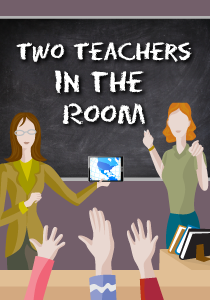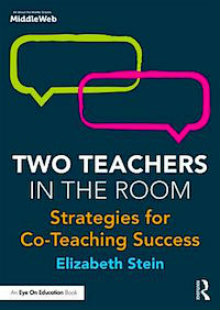For All of Us Feeling Like 1st Year Teachers
A MiddleWeb Blog

From my experiences, there are two ways of thinking about being a new teacher during this school year.
The first comes in the form of Oh, my! I wouldn’t want to be a new teacher during these times – how on earth will they figure it out? The second form of thinking is We are all new to this – it’s like we are all first-year teachers! This post takes the second stance.
We all entered this school year knowing it would be like no other. Last March through June we were forced into crisis teaching. That meant we had no time to plan and figure out how we would shift to remote learning and still provide the level of learning we were used to in our physical classrooms.
So, although many of us have last spring’s experiences to draw upon, the anticipation of this new school year brought with it a commitment to go deeper into the planning for effective learning during these remote, hybrid, live streaming, and for some, all in-person times.
Regardless of how our districts have rolled out the learning structure, we all must be ready to shift to remote or any other mode at any given time. This way of teaching and learning is new for everyone.
2020 in the words of educators
In my work with co-teachers – new and veteran – I like to expand my perspective by asking them how they are doing. I sometimes use this sentence starter to initiate critical conversations to guide us into actions for effective co-teaching during these times. Here’s the prompt:
Co-teaching is like ___ because ___
I have received quite varied responses, from Co-teaching is like making ice cream sundaes, and being with the students is the cherry on top! to It’s like a tiger chasing you when you are in a room with no way out (yikes). I told you the range was wide and varied! These and similar responses came from new and veteran teachers alike. The ice cream sundae response, in fact, came from a brand-new teacher.
It seems counter-intuitive, but I’m finding new teachers are sometimes in a better position for launching this school year. They do not come with previous expectations. And they frequently bring with them the excitement of landing a position that has just launched their career.
In addition, the new educators often exhibit the eagerness and open mind to do whatever it takes to address teaching and learning in non-traditional ways with our students. Of course, many veteran teachers come with this positive mindset as well.
Wherever we find ourselves in these remote and hybrid times, here’s to engaging in a collaborative teaching and learning process where we recognize our individual abilities and come together to increase our collective pedagogical powers.
Moving Forward
Let’s recognize that we are all new to the process of teaching and learning during these times and consider three keys for success as we move forward on our co-teaching journeys this year.
Communication
Consider the ways you are communicating with students, parents, your co-teacher—and your SELF! Where could the flow of listening, speaking, and doing together improve?

As I feel more grounded, I see more clearly how to improve communication with colleagues, parents, and students. If you are not into the idea of free form sketching, try using these mindful sketching and coloring ideas from Positive Psychology to guide you.
Flexibility
Keeping an open mind with one another is a sure-fire way to embrace the level of change and flow that is needed for this school year. We know we must be ready to teach in multiple virtual and possibly in-person formats. Keep a “go with the flow” mindset and enjoy the ways you and your co-teacher are in this together.
Blending Academics and SEL
Academics must be planned with integrity to ensure that our students have opportunities to receive the content and skills they need throughout the school year. But also consider the critical need to be aware of the role of emotions in learning.
This focus on social emotional learning is not new. Yet a silver lining to teaching during COVID-19 is the fact that acknowledging emotions feels less “optional” – the emotional states of students are a “must-consider” component when designing and implementing instruction. See this resource from Edutopia to pique your interest.
Then check out these four strategies via the Association for Curriculum and Development (ASCD) to spark a balance between academic and social emotional learning with your co-teacher and students.
For all those new to teaching this year, realize you have entered the teaching profession in times where veteran teachers need YOU and your fresh insights. Connect with colleagues who will collaborate and communicate with you in a reciprocal teaching and learning process. These are times when everyone is secretly if not openly hungry for support. And our students’ learning lives depend on it!
My hope is that when we feel like we are in a room with a tiger chasing us, we can say: Bring it on! I have my co-teacher, my colleagues, and my SELF to tackle this tiger.
































